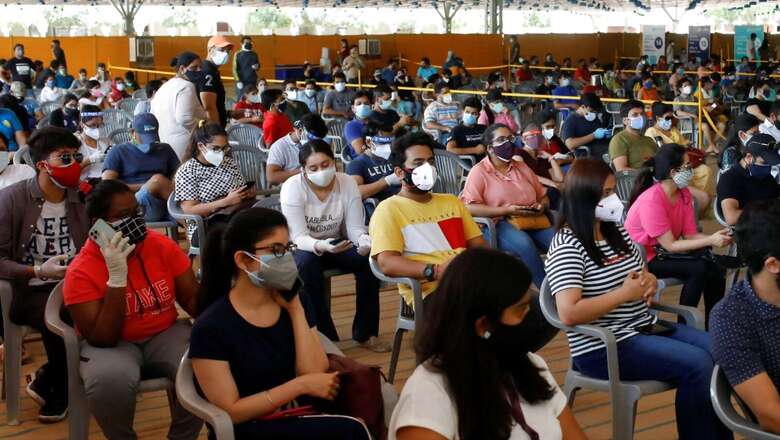
views
It has been about two years now since the ubiquitous, tiny, invisible enemy “the coronavirus” has wreaked havoc on our physical and mental well-being, healthcare systems, education of our youngsters, economy and the social fabric of the society.
No other communicable disease in the last 50 years of my medical practice has caused this kind of a disruption of the society.
Our reaction to the virus also has changed over the last two years. We have moved from utter disbelief and confusion in the first wave, to panic and distress in the second wave to finally, slow acceptance of coexistence in the third wave.
During the first wave, it was an absolutely new virus and the medical and scientific fraternity had very little knowledge about it and how to deal with it. This led to severe lockdowns and travel bans, causing significant misery and loss of livelihood for millions of people.
Though we knew more about the virus, vaccination was available and certain treatment protocols were in place during the second wave, yet the Delta variant of the virus was particularly brutal because of its virulence and devastated the healthcare system with significant morbidity and loss of precious lives. It took quite some time to recover and there was a sense of fear, panic and tremendous distress in the society.
Just when we were breathing easy the third wave with Omicron is sweeping through the country like wildfire but the silver lining so far is that a large number of population has either been vaccinated or previously exposed to COVID and the disease is mild with very low morbidity and mortality.
Now there is a sense of acceptance in the society that we have to learn to live with COVID without fear and without letting our guard down. Human beings are very adaptable and we as a society have been known to overcome many previous calamities, be it wars, natural disasters or pandemics.
Japan and Europe were rebuilt to become some of the most developed societies after the terrible destruction of World War II.
We built a superb surveillance and security system at the airports following the terrorist hijackings of planes which started in the ‘70s. This was certainly an inconvenience and a change in our way of life but we have re-adjusted to it so that we can travel safely.
When the AIDS epidemic struck in the ‘80s, people were mortally scared of this disease and a great deal of stigma was attached to patients with the disease. However, with the acceptance of universal precautions to prevent transmission of the disease and effective treatment protocols, HIV does not evoke a response of fear or stigma in the society anymore.
A similar change is needed in our approach to the COVID pandemic in the future, which hopefully will become an endemic soon.
Many countries which had a zero tolerance policy with significant lockdowns, other restrictions and travel bans are rethinking their policies on dealing with COVID.
We need to strike a balance between lives and livelihoods for the society to move forward. The UK, the European nations and the US are rethinking their policy on COVID and moving away from lockdowns, travel bans and other restrictive measures.
We certainly are in a much better position today than we were two years ago for many reasons:
1. We have a better understanding of the disease, treatment modalities are now available and have been protocolised.
2. Vaccines for both primary vaccination and booster doses are now available along with better and ramped up health care facilities.
3. Widespread exposure to the virus during the first, second and third waves and the less virulent form of the virus (Omicron) currently in circulation has made the disease very mild.
All of these factors are conducive for a peaceful coexistence with COVID. However, this comes with a stark reminder that we cannot and should not let our guard down lest history repeats itself.
How do we get back to normal?
1. COVID appropriate behaviour in the form of masking, distancing, hand washing and avoiding large crowds, continuing the mass vaccination programme aggressively, robust surveillance and public health measures are the key to getting our life back to normal.
2. As already suggested by the ICMR, we need a paradigm shift in our testing policy. Restrict testing only to symptomatic patients and high-risk contacts so that our resources are better utilised for other aspects of COVID management. We also need to relook at our quarantine and isolation policies for asymptomatic patients so that we do not deplete our work force.
3. The government has done an outstanding job of administering over 160 crore doses of the vaccine, offering a precautionary dose to the high-risk population and opening up vaccination for children in the age group of 15-18 years. We must congratulate the government for carrying out this unprecedented herculean task, free of cost to the citizens of this country. We have also ramped up the production of vaccines and there is no dearth in the country now. We also have strengthened the healthcare infrastructure and logistics of vaccine delivery in every nook and corner of the country.
This would also be the right time to liberalise vaccine availability for the precautionary (booster) doses, both in the government and private sector, and make vaccine available on demand with a doctor’s prescription with certain caveats, like for any other vaccination in the country.
4. Mandatory vaccine completion certificate for travel and public activities will go a long way in controlling COVID and is something we need to implement.
5. Most of us have developed extreme COVID fatigue which has reached the point of frustration and are waiting to get our life back to normal and this can only happen if the government and citizens work together. No country can conquer a pandemic without the active support of its citizens.
Being an eternal optimist, I do believe we now have a great window of opportunity to breathe easy, literally and figuratively, if all of us work as a team to get back to a peaceful coexistence with COVID unless of course COVID surprises us again with a virulent mutation.
Dr Sudarshan Ballal is Chairman, Manipal Hospitals. The views expressed in this article are those of the author and do not represent the stand of this publication.
Read all the Latest Opinions here

















Comments
0 comment